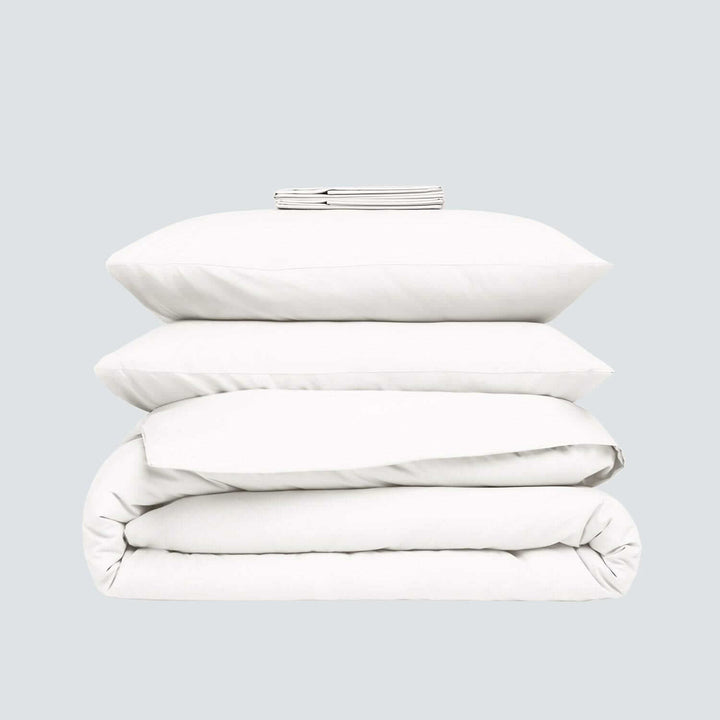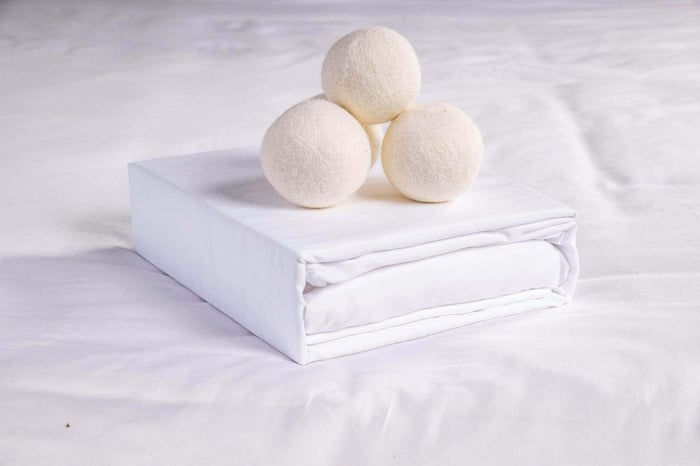Table of Contents
- Advantages of eco-friendly sheets
- Types of eco-friendly materials for sheets
- How eco-friendly sheets benefit the environment
- Impact on Sustainable Bedding
- Cost comparison of eco-friendly vs traditional sheets
- Tips for choosing the best eco-friendly sheets
- How to care for eco-friendly sheets
- The importance of thread count and weave in eco-friendly sheets
- Finding eco-friendly sheet suppliers
- Better Sleep Quality
- Conclusion: making the switch to eco-friendly sheets
- FAQs on Wool Duvet Inserts, Comforters & Sustainable Bedding
Advantages of eco-friendly sheets
Eco-friendly sheets are made from sustainable materials like organic cotton, bamboo, or eucalyptus, so they are better for the environment. They are also free from harmful chemicals and dyes, making them hypoallergenic and safe for sensitive skin.
Additionally, these sheets have excellent breathability, which helps regulate your body temperature for a comfortable night's sleep. Lastly, choosing eco-friendly sheets supports ethical labor practices in the textile industry and promotes a more sustainable future.
Types of eco-friendly materials for sheets
Several materials are available when choosing sheets for your bedroom. Some popular options include organic cotton grown without synthetic pesticides or fertilizers; bamboo, known for its softness and breathability; Tencel, made from sustainably sourced wood pulp; and linen, a durable and biodegradable fabric. Each material has unique qualities, so it's essential to consider factors such as breathability, sustainability, and comfort.
Regenerative Organic Cotton Sheet Set – Soft, Breathable & Sustainable

$189.00
Softer Sheets. Cleaner Sleep. Our organic cotton sheet set are simply better for the earth, and for your sleep. Grown on low-impact regenerative farms that actively heal the soil, our cotton is then woven and finished responsibly. This process eliminates… Read more
How eco-friendly sheets benefit the environment
Sheets made from sustainable materials have a lower environmental impact than traditional sheets. They are often made from organic cotton, bamboo, or hemp, which are grown and produced using methods that minimize environmental harm. Additionally, producing better sheets usually involves fewer chemicals and pesticides, reducing air and water pollution. By choosing better sheets, you can contribute to preserving natural resources and supporting sustainable farming practices.
Beyond environmental ethics, your well-being is our priority. Our commitment ensures that all of our Natural Bedding is certified Hypoallergenic and completely Non-Toxic. The natural properties of wool make it highly resistant to dust mites, mold, and mildew, which are common nighttime allergens. This inherent cleanliness, combined with our rigorous processing standards—free from harsh dyes, bleaches, and chemicals—makes our bedding ideal for Sensitive Skin. You can trust you're investing in a product that supports a genuinely clean and healthy sleep environment.
Impact on Sustainable Bedding
Switching to eco-friendly sheets can positively impact the environment. By choosing sustainable bedding, you can reduce waste and preserve natural resources. Sustainable sheets are often made from organic materials, which can benefit those with sensitive skin or allergies. This switch can also support the local economy, as Scottsdale has a growing sustainable and environmentally friendly product market.
Sustainable & Regenerative Bedding Bundle | No More Night Sweats, Just Deeper Sleep

$598.40
$748.00
Cooler Nights & Deeper Sleep — Every Night Elevate your sleep with the only sustainable bundle crafted from regenerative New Zealand wool and organic cotton for true all-season comfort. These breathable, eco-friendly fibers naturally wick away heat and moisture to… Read more
Cost comparison of eco-friendly vs traditional sheets
Sustainable sheets may initially seem more expensive than traditional sheets, but they can be a wise investment in the long run. While traditional sheets can vary widely, some are more affordable. Sustainable sheets are typically made from higher-quality and sustainably sourced materials, which can justify the higher initial cost. Additionally, better sheets are often more durable and can last longer, making them cost-effective. Remember that the exact cost comparison will depend on the sheets' brand, material, and thread count.
Tips for choosing the best eco-friendly sheets
When choosing sustainable sheets, look for certifications such as GOTS or OEKO-TEX, which ensure the sheets are made from sustainable and non-toxic materials. Consider the sheets' fabric, like organic cotton, bamboo, or linen, as these are more sustainable options. Check the thread count, as higher thread counts are not necessarily better and can indicate the use of lower-quality fibers. Look for durable sheets that can withstand multiple washes, reducing the need for frequent replacements. Consider the price and compare different brands to find the best quality for your budget.
How to care for eco-friendly sheets
Better sheets require gentle care to maintain their sustainability and durability. Here are a few tips to keep your sheets in top condition:
- Wash with cold water: Using cold water reduces energy consumption and helps preserve the integrity of the fabric.
- Opt for natural detergents: Choose laundry detergents from plant-based or biodegradable materials to minimize chemical exposure and promote eco-friendliness.
- Avoid fabric softeners. These products often contain synthetic chemicals that can harm the environment. Instead, consider using wool dryer balls to soften your sheets naturally.
- Line dry whenever possible: The sun's natural bleaching and sanitizing properties are excellent for sustainable sheets. If line drying isn't an option, use a low-heat setting on your dryer.
- Store with care: When putting away your sheets, ensure they are completely dry to prevent mold or mildew growth. Consider using natural, breathable storage materials to maintain the sheets' freshness.
By following these simple steps, you can extend the lifespan of your sustainable sheets while reducing your environmental footprint.
The importance of thread count and weave in eco-friendly sheets
To get the most out of your sustainable sheets, it's essential to understand the significance of thread count and weave. Thread count refers to the number of threads woven into a square inch of fabric. Generally, a higher thread count indicates a softer and more luxurious feel. Meanwhile, the weave of the fabric determines its durability and breathability. Percale weave, for example, is known for its crisp and relaxed feel, while sateen weave offers a silky smooth texture. Making an informed choice about thread count and weave will help you select the perfect eco-friendly sheets for a comfortable and sustainable sleep experience.
Finding eco-friendly sheet suppliers
To find eco-friendly sheet suppliers, visit local organic bedding stores or check eco-friendly marketplaces online. You can also contact eco-friendly home goods brands to inquire about their availability in Scottsdale. Additionally, explore local farmers' markets and artisan fairs, as they often feature vendors specializing in sustainable products. Remember to ask about the materials used and the production process to ensure the sheets meet your eco-friendly standards.
Better Sleep Quality
Eco-friendly sheets, such as those made from organic cotton or bamboo, offer exceptional softness and breathability. This contributes to better sleep quality, allowing you to wake up feeling more refreshed. The absence of harsh chemicals can also reduce skin irritations, creating a more comfortable sleep environment.
Conclusion: making the switch to eco-friendly sheets
Making the switch to eco-friendly sheets for your bedroom can have various benefits. Not only are eco-friendly sheets made from sustainable materials, but they are also free from harmful chemicals, making them safer for you and the environment. These sheets are often more breathable and comfortable, promoting better sleep quality. By choosing eco-friendly sheets, you can reduce your ecological footprint while enjoying a healthier and more comfortable sleeping environment.
Regenerative Organic Cotton Sheet Set – Soft, Breathable & Sustainable

$189.00
Softer Sheets. Cleaner Sleep. Our organic cotton sheet set are simply better for the earth, and for your sleep. Grown on low-impact regenerative farms that actively heal the soil, our cotton is then woven and finished responsibly. This process eliminates… Read more
FAQs on Wool Duvet Inserts, Comforters & Sustainable Bedding
Are organic cotton sheets truly softer than conventional cotton?
Yes. Organic cotton is processed without harsh chemicals, which prevents the fibers from being damaged. This results in a naturally softer and more durable fabric that retains its comfort wash after wash.
How does bamboo fabric compare to organic cotton for breathability?
Both fabrics are highly breathable. Bamboo often has a silky, draping feel, while organic cotton is known for its crispness. Both materials offer great breathability to help with temperature control.
Do eco-friendly sheets require special washing or care instructions?
Generally, they require gentle care. It's best to wash them in cold water with mild, non-toxic detergents and air dry or tumble dry on low to maintain the fabric's integrity and ensure longevity.
Are there eco-friendly alternatives to down or polyester comforters?
Yes. Natural wool and recycled materials are excellent alternatives. A Wool Comforter (made from natural, breathable fibers) provides the best all-season performance compared to less breathable synthetic polyester.
What is the main benefit of choosing naturally dyed or undyed sheets?
Choosing naturally dyed or undyed sheets minimizes your exposure to synthetic dyes and harsh finishing chemicals. This is a key advantage of Non-Toxic bedding for those with sensitive skin or chemical sensitivities.



